KALKARINGI STATEMENT
Kalkaringi is near Wattie Creek, the site of the historic Wave Hill walk-off. In 1966 Aboriginal people walked off Wave Hill station in protest at appaling living and working conditions. The walk-off developed into a demand for land rights.
"We want to see the government people
here so we can talk face to face. Not sit down in air-condition. Not
fair for Yapa people. And making laws for Yapa people. We never been
along a school."
- Mr Rangiari
"We got our own law. Can't stop it
can't change it. How can we change it. Not like a piece of paper like
toilet paper. In the land, our constitution. For all our little children,
that is the law for blackfella not like white man they got Humpdy Dumpdy
that's all."
- Dick Leichleitner
"Been there before donkey even been
born. We are first in this land. All my people. Australia bigger than
England. You can make seven states here."
- Mr S.
"This law never been change from creation
to creation. This law been stay strong not only for Warlpiri. But Aboriginal
nation all around, it never been changed. It is still there."
- Joe Anderson
"We were here before Captain Cook,
he reckon we were monkeys. Capt James Cook came a long time ago. When
he first landed in Sydney he said Aboriginal people were going around
like monkeys with boomerang and spear, that why he said Australia belong
to the Queen. We started having no control. We got we can read, we can
read in both ways, we can read two way - English. White man got computer,
we got a computer in our brain. In passing generations. And we still
got it. If some of our old people die, what we going to do. We got to
start to act now.
- Keith Jurra
"When Capt Cook was told to come to
this part of the world he was told if he found people he should get
the consent of the natives. The people travelling with Cook made an
error - they did not understand. They asked whether there were natives,
they got to get their consent. They said, 'we only saw people on the
coast living off fish and didn't have crops', they thought there were
no people in the interior. They were wrong and it took a lot of years
for Australian law to pay some respect to Aboriginal people."
- Garth Nettheim
Constitutional Law expert UNSW.
At the opening session, the representatives
of the tribal groups present at Kalkaringi made it quite clear that
the first Europeans to visit Australia simply made a mistake in thinking
that the country was uninhabited.
The question for them was not whether Aboriginal Australians have a
special claim to their ancestral homelands - that is taken for granted.
The problem is in getting governments to acknowledge this fact and to
work towards re-establishing and strengthening the ties that were severed
by the ignorance of the early colonial powers.
Politicians from both the NT government and the Federal government went
to Kalkaringi, to speak and to listen.
Day One was Monday 17th August and Victor Vincent welcomed everyone
to his land. From the start the debate was lively with the common theme
being a heart-felt fear that the new constitution for the state of the
Northern Territory was not going to adequately protect Aboriginal interests.
Calls were made for the Federal Government to fund Aboriginal organisations
directly rather than channel funds through the NT Government.
Smithy Zimran, a senior traditional owner from Kintore on the NT-WA
border, claimed the Territory Government was not passing on money earmarked
for Aboriginal people.
Maggie Hickey, Leader of the Opposition in Darwin was the first politician
to speak. Federal Shadow Minister for Aboriginal Affairs Darryl Melham,
Territory MLAs John Ah Kit and Peter Toyne also addressed the gathering.
The Labor politicians supported statehood for the Territory as long
as there was guaranteed protection for Aboriginal rights.
The Territory government was represented by Health Minister Dennis Burke,
Aboriginal Development Minister Tim Baldwin and CLP MLA Steve Hatton.
Mr Burke did his best to assure everyone that there was no cause for
concern. "These things will be worked out in due course,"
he said.
This prompted lively debate from delegates who pointed out that the
CLP Government had opposed nearly every land claim lodged by Aboriginal
people.
WHAT THE POLLIES SAID ...
Maggie Hickey:
Thank for welcoming us. Talking about statehood today, let me be clear
up front the ALP believes in statehood and that the NT should become
a state. The target date, 2001, is achievable.
But the move to statehood should be fair. It should be good and fair
for Aboriginal people. We believe the people of the NT should have control
of it, not the politicians. We reject the way the CLP is excluding Aboriginal
people.
Almost all the people who attended the statehood convention in parliament
house were hand picked by Shane Stone, also only 1% of NT people had
a vote at this convention. It was a poor convention and we do not agree
with its resolutions, but we do agree with this convention and we wish
you very well with your deliberations because you should have your say
in your country.
These are things that we don't like in the DRAFT Constitution:
The CLP voted no to protecting the Aboriginal Land Rights Act in the
Constitution, the ALP supported that being in there. We wanted protection
for sacred sites in the Constitution and they voted no. They voted no
to fair government things like Freedom of Information. The Constitution
its about keeping the CLP in power.
John Ah Kit:
There was twelve years of work by the sessional committee on statehood.
Over 90 Aboriginal communities were visited. The committee talked also
with a lot of other people, industry groups and so on.
After 12 years we got to the Constitution convention in Darwin and all
that work of 12 years was pushed aside. There was another piece of jurra
that surfaced at the convention and it was only this paper that the
delegates could consider. The concern Aboriginal people have is to ensure
the Constitution is fair. If the Constitution does not look after those
rights, if it's not going to stand up and say your rights are to be
protected then no wonder Aboriginal are people worried about this Constitution.
Dennis Burke:
I was one of 56 Territorians at the Statehood Constitution.
Of those 56 people there were Aboriginal delegates there. Some stayed
for the whole of the convention. Some left early. There were people
from all over the NT at that convention.
No-one will lose any of their rights under Statehood and if anyone tells
you that they are telling you a lie. Nobody will miss out on their rights.
And Statehood is not just for CLP or ALP or land council, but for everyone
- for territorians.
The (statehood) convention was done by the sessional committee if anyone
reads this, it has lots of different ways of doing things and that is
what went to the constitution. This book and all their ideas.
The 56 people decided some things would go in and some out. Think about
those 56 people, think what kind of blood flows in the territory. All
people in the territorians are different, Chinese, Irish, German, Lebanese,
Aboriginal - all different. We are mixed. We as a government have to
get the balance that everyone can live with. Not the finished plan but
the framework the roof and wall that we can all live with. That is what
the con came up with as the draft.
This constitution tries to say to all Territorians and all other Australians
that this is the way Territorians see themselves this is the way Territorians
want to go forward in the future. This is the Territory we want to leave
our children for the future. I am happy to answer any questions.
Dick Leichleitner :
All of this is going out of the other ear.
GS:
We got three days to talk about this man. Let him talk we know we don't
like some of the things he says in government - let him have a go. You
mob can rip it in to him then. I don't agree I totally disagree.
Dennis Burke: (resumes)
This constitution is for all territorians. Aboriginal people are 30%
and are very important but not because you are Aboriginal but because
you are Territorians. We are trying to get a balance that is what we
are trying to do with this document.
Now I worked very hard to get this constitution document done and I
can say that I worked very hard for this document. For people who don't
like it - I want to hear your criticisms. There are no other constitution
documents that recognise, in the preamble, Aboriginal people in this
way.
It recognises from the beginning of time you were here and since the
commence of white people in 1788 have come to this land, and worked
together. If you want better words tell me what they are.
Brian Harradine:
I want to say this to you, as you may have been given the impression
that I backed down on the Wik Legislation. When I was confronted early
July or late June, the Queensland election had seen Ms Hanson receive
24% of the vote. There was a great deal of soul search by the Government
and they decided that they would go to a doubble dissolution election.
It would have been a race based election and race relations would not
have been restored for 40 years.
o o o
People at the conference made it clear
that the negotiations with the NT Government are only just starting.
The Northern region of the Territory will host their convention in Batchelor
between 5-9th October.
If you wish to know more about the conventions or to register as a delegate
to the Batchelor conference phone the ATSIC State Office in Darwin on
Toll Free 1800 019 156, the Northern Land Council on Toll Free 1800
645 299.
The question of statehood for the NT is not just saying simply yes or
no.
A Question of Health
On day three there was a lively discussion about healthcare.
Many speakers identified the centralisation of health provision as one
an ongoing source of family and community disruption.
This is a problem for bush communities especially where a trip to a
regional centre for tests can become a nightmare of unfamiliar places,
odd customs and scary machines.
John Liddle, Director of Congress in Alice Springs put it like this:
"We need to keep people in their communities. When sick people
have to come to town they bring their families with them. Next thing
you know they are getting locked up in gaol, you've got people in gaol,
in the courts, in hospital; it's all too much pressure for people to
deal with - and on top of that there's the 'three strikes' law.
"I think its a great idea to get support to have (dialysis) machines
into communities.
CLC launches new book
Take Power is a hefty (381 page) collection of vignettes
from the first twenty years of the Central Land Council, told by people
who were there. Mostly upbeat, but from a variety of perspectives: senior
Aboriginal people, legal people, office and field staff, researchers,
and politicians black and white.
Relevant small photographs are sprinkled through the text, and a short
background explanation introduces many pieces. The cover shows Gough
Whitlam pouring a handful of soil into the open palm of Vincent Lingiari.
A fair number are set around Tennant Creek: at places such as Cabbage
Gum Bore, Kurundi and McLaren Creek to the south, Yankirrikirlangu (Emu
Bore) to the west, Kalumpurlpa to the north-west, the Wakaya Desert
and Ilplerrelhelame (Lake Nash) to the east. Brief life stories include
one by Harry Bennett who featured in last month's Barkly News Pictorial.
Take Power is edited by Alexis Wright, author of Plains of Promise and
Grog War.
Copies of the book can be obtained from JB Book Supplies on 8297 1667
for $24.95 plus p&p.
"We need to
sit down and talk."
Tracker Tilmouth reflects on
the message from Kalkaringi
What do you think is the main message to have come
out of this convention?
The main message is definitely that Aboriginal people aren't satisfied
with the process and the drafting of the Northern Territory constitution.
They weren't involved, they proved they weren't involved and this government
now has a problem on its hands in that they haven't involved all Territorians.
This is a rushed job and Shane Stone should be ashamed of himself.
What about the fundamental issues? People like Pauline
Hanson and even John Howard, stand up and say, "Look, it's got
to be one rule for everybody, there's no difference about anybody in
this country, nobody should have any special rights"?
Well look, you can't say that after you've taken all the resources.
You can't say, "We should all be equal now", after you've
taken everyone's land. After you've taken all the mining, wrecked all
the rivers and then say, "Now we're all equal". You can't
do that after, you've got to do that before, everyone should be equal
before - equal rights for land, equal rights for a whole range of things.
You can't say we should all be equal after the party.
Who would you like to give credit to for the Kalkaringi
statement and for the event itself?
Well I'm giving credit to the Aboriginal community in Central Australia,
who decided that enough's enough. We will not tolerate anymore. That's
the message to everyone, that we've tolerated this government too long.
![]()

Alison Anderson, Papunya
Community Council Clerk read the Kalkaringi Statement to the delegates,
wathed by meeting Chair, Max Stuart.

Tony Tjamiwa.

Lena Apwerl from Utopia.
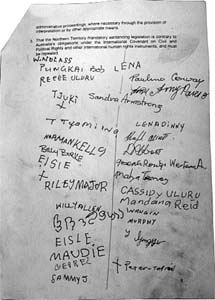

Elders from all over
the CLC region then came forward and signed the document (above).

Harry Nelson Jakamarra
makes his point at the convention while (from left) Joe James, Doug Johnson
and Dennis William look on.
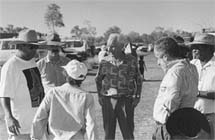
Kulum Rangiari speaks
up to the assembled politicians.

Arthur Shadforth stokes
up the fire for the bulk vegies.

Brian Harradine pegs
his tent.
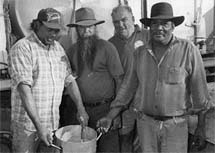
David Blue, Laurie
Presley, Bill Clarke and Arthur Shadforth kept the 3000 litres a day flowing
fresh and cool.
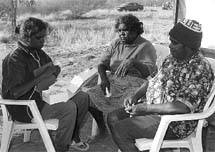
Health worker Josephine
Brinjen takes a blood sugar levels reading from Eileen Bonny and Lillian
Morton.
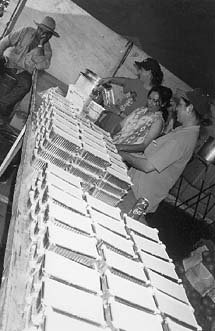
Kellie Drew, Tricia
Satour and Fiona Keighran made thousands of take-away dinners for the
masses


Senator Nick Bolkus
tells a few anecdotes from the book as Alexis looks on.

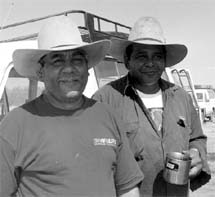
CLC Director Tracker
Tilmouth with Steven Ellis.